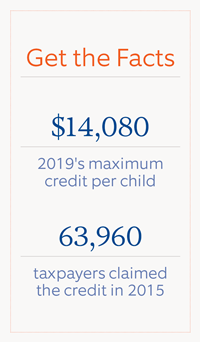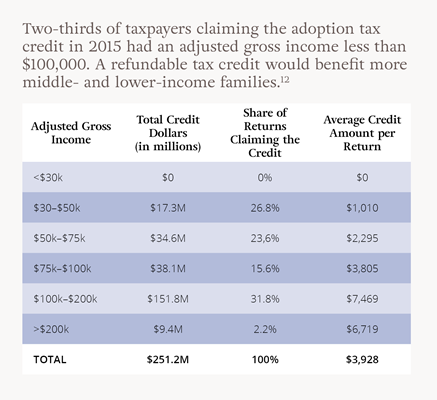The Adoption Tax Credit Can Help You
Adoption Advocate No. 132
Editor's Note: As of July 2025, the Adoption Tax Credit is now partially refundable. Updated information on the Adoption Tax Credit is available here.
While Americans have a very positive view of adoption, a majority describe private adoptions as either expensive or very expensive.1 For this reason, it is important for families to understand the adoption tax credit—whether they are adopting through the foster care system, through private domestic adoption, or through intercountry adoption.
When filing their tax return, an adoptive family can apply this credit toward their federal tax liability, which can reduce what the family owes in federal income tax. It is currently not a refundable tax credit; however, it is a significant credit to offset expenses associated with an adoption if the adoptive family qualifies to receive it.2
A Brief Legislative History of the Adoption Tax Credit
The adoption tax credit first became available to American taxpayers following the passage of the Small Business and Job Protection Act of 1996.3 This was due, in no small part, to the advocacy of National Council For Adoption4 and other advocates seeking to make adoption more affordable for families. Beginning in 1997, the credit was up to a maximum of $5,000 for qualifying families, and has been repeatedly expanded in subsequent years. The Economic Growth and Tax Relief Reconciliation Act of 2001 expanded and extended the adoption tax credit until 2010.5
In 2010, two laws were passed impacting the adoption tax credit. The Patient Protection and Affordable Care Act both increased the credit and made the credit refundable (for years 2010 and 2011).6 The Tax Relief, Unemployment Insurance Reauthorization, and Job Creation Act of 2010 extended the credit, but ended the modifications made by the Affordable Care Act (including an end to refundability of the credit in 2011).7
The American Taxpayer Relief Act of 2012 made the adoption tax credit a permanent part of the tax code.8

Qualifying for the Adoption Tax Credit
You qualify for the adoption tax credit if you adopted a child (unless it is a spouse’s child) and paid out-of-pocket expenses relating to the adoption. The amount of the tax credit you qualify for is directly related to how much you spent on adoption-related expenses. Income can also be excluded as taxable through an employer-provided adoption benefit program. Both a credit and exclusion may be claimed for the same adoption; however, both cannot be claimed for the same expenses.
If you adopt a special needs child through foster care, you may be entitled to claim the full amount of the adoption tax credit. Each state has different criteria that qualify a child as special needs and eligible to claim the tax credit. The special needs declaration must come from the state in which the adoption was final. The “subsidy agreement” has the determination of special needs that the IRS accepts. Some states call it the “adoption eligibility assistance determination.”
No intercountry adoption is considered special needs for IRS purposes, so for these families the credit is for the amount of qualified expenses only.
There are eligibility restrictions based upon taxpayers’ modified adjusted gross income (MAGI). For example, in tax year 2018, the MAGI phase-out begins at $207,140 and ends at $247,140.9 The adoption tax credit limitations and restrictions change on an annual basis and should be referenced through IRS publications.
How the Adoption Tax Credit Works
The difference between your tax liability and your federal withholding is either what you get as a refund or what you owe when you do your tax return. For those who are eligible, the adoption tax credit covers your tax liability up to the maximum amount of the credit. You will get your withholding back if tax liability is less than the maximum credit amount.
To claim the adoption tax credit, you must file IRS Form 8839, which includes specific information about the child by adoption.10
If the child by adoption does not have a social security number yet, the filer can use an adoption taxpayer identification number (ATIN).11
If you do not use all of the credit in the first year, you can carry it forward for up to five years.
Documentation Needed for the IRS
Taxpayers who claim the adoption tax credit should keep, at a minimum, the following documentation in case they are audited by the IRS:
- Adoption Assistance Eligibility Determination (Subsidy Agreement) that declares the child special needs, if claiming credit for a child declared special needs by your state through foster care (only applicable to adoptions from foster care).
- A home study/placement agreement completed by an authorized placement agency (for all types of adoption except adoptions from foster care).
- All documentation of paid qualified expenses (for all types of adoption except adoptions from foster care).
- Final Judgment of Adoption (for all types of adoption).
All documents must be signed and dated (for all types of adoption). The IRS will not accept home studies, placement agreements, judgments of adoption, or subsidy agreements/eligibility agreements unless they have been signed and dated by the proper authorities.

A Refundable Adoption Tax Credit
The adoption tax credit is currently a nonrefundable credit. It still helps many families, however it would help many more families if it were refundable. A nonrefundable credit is subtracted from your income tax liability, up to the total amount you owe, but unlike a refundable tax credit, a nonrefundable credit cannot reduce your tax balance beyond zero.
Since it is not refundable at this time, it will not cover self-employment tax, early pension distribution penalty, or first-time homebuyer payback. When the adoption tax credit is refundable it will help many more families in the lower to medium income range and others who have a low federal tax liability.
FAQ About the Adoption Tax Credit
Q: Does the adoption tax credit just reduce my federal tax liability, or does it reduce my state tax liability as well?
A: This article and the information herein focuses on federal tax benefits. Many states do have an adoption tax benefit in addition to the federal tax credit. These state benefits can be claimed when filing state tax returns.
Q: Why does the adoption tax credit amount change from year to year?
A: The amount of the credit is adjusted for inflation each year. The eligibility restrictions based upon taxpayers’ modified adjusted gross income (MAGI) are also adjusted for inflation each year.
Q: How does it work if a family adopts more than one child during the same tax year?
A: The adoption tax credit is calculated based on a per child basis, so qualifying families who adopt multiple children will have the credit assessed on a per child basis.
Q: Because the credit is now permanent, does that mean it cannot go away in the future?
A: No, when a credit is said to be permanent, it means it is not scheduled to “sunset” or be terminated. However, future legislation could eliminate this credit or alter the credit in positive or negative ways. It is unlikely to be eliminated in the near future, as the recent tax changes did not touch the adoption tax credit.
Additional Resources
Follow @AdoptTaxCredit on Twitter
Adoption Tax Credit Working Group homepage: http://adoptiontaxcredit.org
IRS Adoption Credit and Adoption Assistance Programs: www.irs.gov/taxtopics/tc607
Bills Tax Service Specialists: http://centralia-il-taxservice.com/tax-services/adoption-tax-services
References
- https://www.davethomasfoundation.org/wp-content/uploads/2018/02/2017-adoption-attitudes-survey-us.pdf
- This information is provided for general educational purposes and is not meant as tax advice. This is a general summary and does not cover each family’s unique situation. Consult a competent tax adviser for individual advice regarding your own situation.
- Public Law 104-188 https://www.congress.gov/104/plaws/publ188/PLAW-104publ188.pdf
- Dr. Pierce’s testimony before Ways and Means Committee
- Public Law 107-16 https://www.congress.gov/107/plaws/publ16/PLAW-107publ16.htm
- Public Law 111-148 https://www.congress.gov/111/plaws/publ148/PLAW-111publ148.pdf
- Public Law 111-312 https://www.congress.gov/111/plaws/publ312/PLAW-111publ312.htm
- Public Law 112-240 https://www.congress.gov/112/plaws/publ240/PLAW-112publ240.pdf
- https://www.irs.gov/taxtopics/tc607
- https://www.irs.gov/pub/irs-pdf/f8839.pdf
- https://www.irs.gov/individuals/adoption-taxpayer-identification-number
- Congressional Research Service. Adoption Tax Benefits: An Overview. https://fas.org/sgp/crs/misc/R44745.pdf



